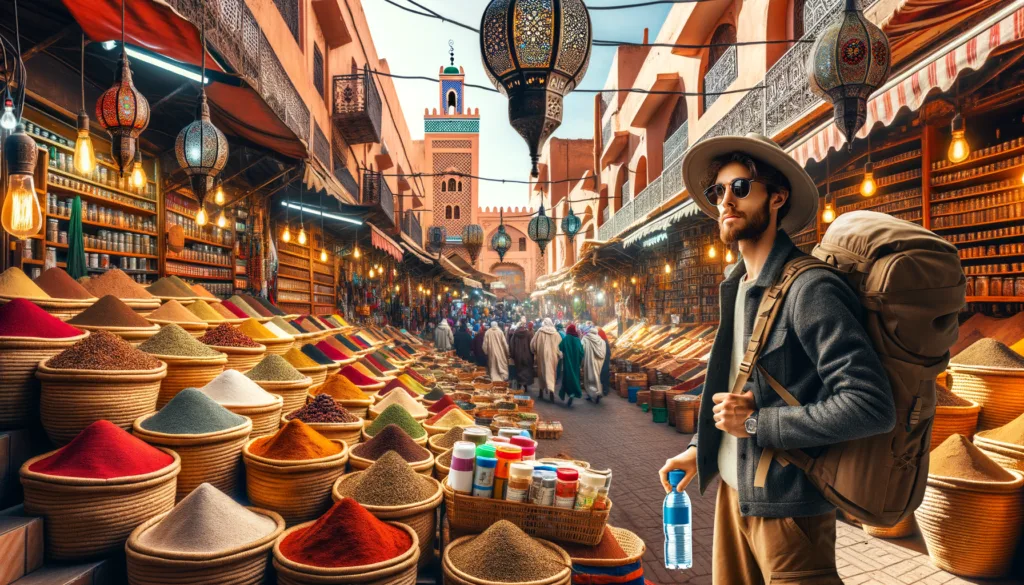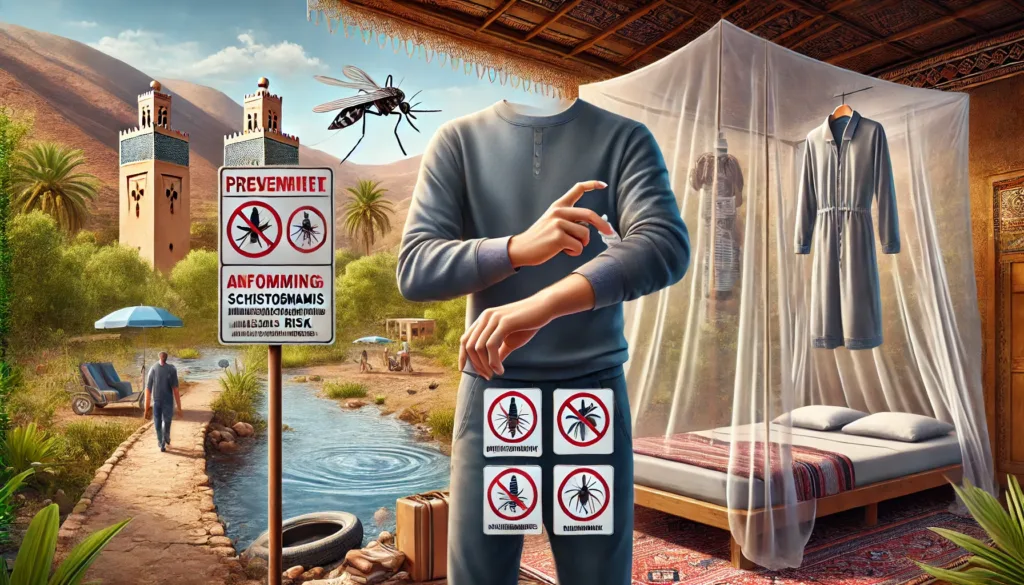
Few places on Earth ignite the senses quite like Morocco. This captivating North African country boasts bustling souks filled with vibrant textiles, the aromatic allure of spices, majestic palaces, and unforgettable landscapes that range from the golden dunes of the Sahara to the towering peaks of the Atlas Mountains. Its unique blend of tradition and modernity positions Morocco as a bucket-list destination for travelers from around the world.
But while you’re immersing yourself in Morocco’s countless wonders, staying healthy should remain top-of-mind. From savoring lavish tagines to wandering crowded medinas, each experience comes with its own considerations for well-being. Taking the right health precautions ensures your trip is safe, enjoyable, and filled with memories—not ailments.
This guide will arm you with essential health tips, from pre-trip vaccinations to bug bite prevention strategies, so you can fully enjoy your Moroccan adventure with peace of mind.
Vaccinations and Medications
Why Vaccines Matter
Vaccines are your first line of defense against illnesses that could derail your trip. They not only protect you but also contribute to preventing the spread of diseases in the communities you visit. Morocco, while generally tourist-friendly, has health risks that travelers should be mindful of, making pre-trip vaccinations a critical step for safeguarding your well-being.
Recommended Vaccines
- Hepatitis A and B: Essential for protection against contaminated food or water, and exposure to infected individuals.
- Typhoid: Recommended, as Morocco’s food scene can pose a higher risk for typhoid due to contaminated water or food.
- Rabies: If you plan on exploring remote areas or may interact with animals, a rabies vaccine is advisable.
- MMR (Measles, Mumps, Rubella) and Polio Booster: Ensure you’re up-to-date on routine vaccines.
- COVID-19: Stay informed about the latest travel advisories and requirements regarding COVID-19 vaccinations.
Pre-Trip Health Check
Before boarding your flight to Morocco, schedule a visit to your healthcare provider. This is the perfect opportunity to confirm you’re fully vaccinated and discuss any additional medications you might need. Based on your itinerary and planned activities, your doctor may recommend antimalarials, travel-friendly first-aid essentials, or prescriptions for traveler’s diarrhea. Prevention is key, and a proactive approach will allow you to travel with confidence.
Water and Food Safety
Avoiding Waterborne Illnesses
Staying hydrated is essential, but in Morocco, you’ll need to be vigilant about water quality to avoid waterborne illnesses. Always stick to bottled water, ensuring the seal is unbroken before drinking. Remember to use bottled water even for brushing your teeth to minimize potential exposure to untreated tap water.
Avoid ice cubes unless you are certain they are made from purified water, and be cautious with fresh juices from street vendors, as they may use untreated local water.
Food Hygiene Tips
When it comes to food, being selective about where and what you eat is key to staying healthy. Opt for reputable eateries or restaurants that cater to tourists. Avoid street food, as it can sometimes be prepared under unsanitary conditions. Always choose well-cooked dishes, as high heat tends to kill off harmful bacteria and pathogens.
If you’re eager to try Morocco’s incredible street food, stick to stalls that are crowded with locals – it’s often a sign of freshness and quality. Avoid raw or undercooked meats, seafood, and unpasteurized dairy products.
Hand Hygiene
Hand hygiene is one of the simplest and most effective ways to protect yourself from gastro-intestinal illnesses. Be sure to wash your hands frequently, especially before meals and after handling money, as coins and bills can harbor germs. If soap and water aren’t available, use a travel-friendly hand sanitizer with at least 60% alcohol to keep your hands clean on the go.
Preventing Bug Bites and Infections

Insect Protection
Morocco’s climate and diverse landscapes mean that insects, including mosquitoes, can be an issue, especially during certain seasons. Protect yourself by using insect repellents with active ingredients like DEET or picaridin. Apply it on exposed skin and clothing, and consider treating your belongings, like bed nets and gear, with permethrin for added protection.
During dawn and dusk—typically when mosquitoes are most active—wear long-sleeved shirts, long pants, and closed shoes to limit skin exposure.
Infectious Diseases
Leishmaniasis
This parasitic disease, transmitted by sand flies, is a potential risk to travelers in specific regions of Morocco. To prevent bites, use insect repellents, sleep under insecticide-treated bed nets, and stay in accommodations with screened windows and doors.
Schistosomiasis
Schistosomiasis is a parasitic infection that can be contracted by swimming or wading in freshwater lakes or rivers. Steer clear of all freshwater bodies in Morocco to stay safe—stick to the hotel pool instead!
Immediate Care for Bites
If you do get bitten, it’s important to act quickly to prevent further complications. Wash the affected area with soap and water, and apply hydrocortisone cream or antihistamines to reduce swelling and itching. For severe reactions or signs of infection, seek medical assistance as soon as possible. Pack a small treatment kit to ensure you’re prepared for any surprises.
General Tips for Staying Healthy
Emergency Kit
Packing a well-equipped emergency kit is a must for any traveler. Ensure to include essential items such as anti-diarrheal medication, band-aids, pain relievers like ibuprofen or acetaminophen, allergy medications, and motion sickness remedies. Consider adding a small thermometer, antiseptic wipes, and a mild hydrocortisone cream for treating minor skin irritations.
Probiotics and Vitamins
Supporting your gut health and immunity while traveling can help keep illnesses at bay. Incorporate daily probiotics to maintain a healthy digestive system, especially when trying the local cuisine. Additionally, taking Vitamin C supplements or consuming vitamin-rich foods can give your immune system a boost to ward off common colds and infections.
Altitude Sickness Precautions
If your travel itinerary involves destinations at higher altitudes, such as the Atlas Mountains, take measures to prevent altitude sickness. Ascend gradually to allow your body to adapt, stay hydrated, and avoid alcohol during your ascent. If symptoms like dizziness, headaches, or fatigue occur, rest and, if needed, descend to a lower altitude to recover.
Healthcare and Insurance
Travel health insurance is non-negotiable when visiting Morocco. Opt for a plan that covers medical emergencies and includes evacuation coverage in case of severe health situations. Should you need medical care, private clinics are recommended for better service and shorter wait times compared to public healthcare facilities. Be sure to carry a copy of your insurance documents, along with a digital version accessible from your phone or email.
Conclusion
Ensuring that your trip to Morocco remains both enjoyable and safe begins with careful preparation. From getting the right vaccinations to practicing food and water safety, preventing bug bites, and staying equipped with a robust emergency kit, these tips provide a solid foundation for your travel health plan. Don’t forget to adopt additional safeguards such as probiotics for gut health and travel insurance for peace of mind.
Morocco offers an abundance of adventures, from bustling souks in Marrakech to the serene dunes of the Sahara. By taking these health precautions seriously, you can focus on soaking in the beauty, culture, and experiences this stunning destination has to offer.
Finally, consult reliable travel health resources and discuss any concerns with your healthcare provider prior to departure. Wishing you a seamless, worry-free adventure as you embark on your journey to Morocco!
FAQ: Health and Safety Tips for Your Trip to Morocco
What vaccinations are recommended before traveling to Morocco?
Before visiting Morocco, it is advised to ensure your vaccinations are up-to-date. Recommended vaccines include Hepatitis A, Hepatitis B, Typhoid, Rabies, MMR (Measles, Mumps, Rubella), Polio, and COVID-19. Consult your doctor or a travel health clinic to finalize your vaccination plan and get advice specific to your itinerary and health status.
Is the tap water in Morocco safe to drink?
No, it is recommended to avoid tap water in Morocco. Stick to bottled water, which should also be used for brushing your teeth. This precaution helps prevent exposure to unfamiliar bacteria that may upset your system.
Should I eat street food in Morocco?
Though Moroccan cuisine is renowned for its flavors, it’s best to avoid street food to reduce the risk of foodborne illnesses. Opt for well-cooked dishes from reputable restaurants or hotels and ensure the food is handled hygienically.
What precautions can I take to prevent bug bites and infections?
To prevent bug bites, use insect repellents containing DEET or picaridin, and wear protective clothing. For infections like leishmaniasis and schistosomiasis, avoid exposure to sand flies and contaminated water. Immediate medical attention is advised for severe reactions to bug bites.
How can I avoid altitude sickness in Morocco’s high-altitude areas?
To reduce the risk of altitude sickness, ascend gradually, stay hydrated, and consider preventive medication. If symptoms like headaches, nausea, or dizziness occur, descend to a lower altitude promptly and rest until you recover.
What should I pack in my emergency health kit?
Your emergency kit should include essentials such as antacids, anti-diarrheal medication, Pepto Bismol tablets, cough drops, antibiotic cream, band-aids, allergy relief (e.g., Benadryl), pain relievers (e.g., Tylenol or Paracetamol), Dramamine, gas medications, and hand sanitizer.
Do I need travel health insurance for Morocco?
Yes, having adequate travel health insurance is essential. Your policy should cover local treatment and medical evacuation in case of emergencies. This is particularly important if you have existing health conditions or are pregnant.
What number should I call during a medical emergency in Morocco?
In case of a medical emergency, dial 150 to request an ambulance. Always contact your insurance provider promptly if you require treatment or need referral to a medical facility.
What are some tips for maintaining hygiene during my trip?
Wash your hands frequently with soap and water, especially after handling money and before eating. Carry hand sanitizer for situations where washing may not be possible. Additionally, bring tissues as some bathrooms in Morocco may not have toilet paper.
Are fresh juices safe to drink in Morocco?
Be cautious with fresh juices from street vendors, as water may be added to the oranges during juicing. Opt for juices from reputable sources or locations where food safety can be trusted.
Can I get a henna tattoo in Morocco?
Yes, henna tattoos are a cultural highlight in Morocco, but they can cause allergic reactions in some people, leading to swelling or an itchy rash. If you have sensitive skin or known allergies, it’s best to avoid them or request a patch test beforehand.
Do probiotics help with digestive health during the trip?
Yes, taking probiotics before and during your trip can help maintain a healthy gut, especially if you’re prone to stomach issues. Yogurt, a common food item in Morocco, can also serve as a natural probiotic option.